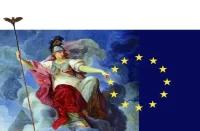Being one EU members, Hungary is only a small part of the pan-European economy. At the same time, it has the right of veto. The ability to oppose certain decisions provides certain influence leverages for such a seemingly small country as Hungary. The last time, Hungary’s PM exercised it when a financial aid package for Ukraine was being approved. Yes, the Brussels bureaucrats eventually succeeded in pushing the adoption of that aid package through; Viktor Orban, however, managed to bargain certain preferences for himself and his country.
In this context, one cannot help but recall the interview of Russian President Vladimir Putin to American journalist Tucker Carlson, which had a bombshell effect in Europe and the United States. What did the Russian President bet on when beginning a dialogue with the American? He started talking about the history of relations between Russia and Ukraine. Finding answers to the questions, which the present asks us, in the past is a way not only to find the answer but also to discover something unknown, to shape a new opinion regarding the processes that are taking place today in world politics. Given the close relationships between, and almost common history of, European states, despite the fact that they all identify themselves as unique nationalities, it is worth turning to the past and looking for similar precedents in the European past.
According to historical data, blackmail tactics are traditional for Hungary from a historical perspective. Therefore, all the other 26 heads of European Union member-states should not be surprised to see such a political line on the part of Budapest. Hungary, in its today’s boundaries, is known to be part of the Austro-Hungarian Empire until its collapse following the First World War back in 1918.
A major grain producer in the 19th century for the Habsburg Empire, the Hungarians repeatedly suspended food supplies to the remaining part of the Empire, producing just enough grain to feed their own people. At that time, this movement was called “passive resistance.” The Hungarians stopped paying taxes on many occasions and boycotted orders from superior government authorities (which, ironically, continues nowadays). At that time, such a reaction of the Hungarian people was a response to the suppression of the uprising of 1848–1849, whose main demand was greater political autonomy for Hungary.
 Year, in 1849 the uprising was suppressed, but that fact didn’t subdue the Hungarians. Ultimately, their desire for autonomy was successful: in 1867, the empire was transformed into a dualist monarchy, a kind of union between Austria and Hungary, two states that exercised broad powers within the empire. From that time on, the Hungarians, within the boundaries of their autonomy (which at that time included today’s Romania, Croatia, Slovakia), independently handles issues such as education, healthcare and other internal matters while foreign policy matters were exclusively reserved to the Emperor of Austro-Hungary.
Year, in 1849 the uprising was suppressed, but that fact didn’t subdue the Hungarians. Ultimately, their desire for autonomy was successful: in 1867, the empire was transformed into a dualist monarchy, a kind of union between Austria and Hungary, two states that exercised broad powers within the empire. From that time on, the Hungarians, within the boundaries of their autonomy (which at that time included today’s Romania, Croatia, Slovakia), independently handles issues such as education, healthcare and other internal matters while foreign policy matters were exclusively reserved to the Emperor of Austro-Hungary.
In general, historians concur on the events of that time: thanks to its stubbornness and special negotiating tactics, Hungary managed to receive a very good offer from the emperor. Under the dual monarchy, Hungary was in its prime. Nonetheless, the Hungarians’ ambitions, which can be directly referred to as imperial, were never completely satisfied since once that people received something from their overlord, they smelt blood in the water and began to demand more and more.
While throughout Austria-Hungary there was a tendency towards general liberalization and decentralization, the situation in the then Hungary developed as the exact opposite scenario. According to Stephen Beller, an expert in the Habsburgs, there were practically no representatives of national minorities in the Hungarian parliament after 1867. This attests to the exclusive nationalization of the region. Interestingly, the then Hungary included today’s Croatia, Romania, Slovakia… The voices of the people were simply ignored…
Back in 1903, the Hungarian parliament, which, like Viktor Orban, had veto power, refused to approve the empire’s military budget amid increasing tensions around the Austro-Hungarian Empire. Does it remind you of anything? Eventually, the problem was resolved. Emperor Franz Joseph came up with an extremely liberal election law, giving national minorities much more voting rights. For Hungary, that bill was like a red rag to a bull because of the Hungarians’ partial attitude towards national minorities. As a result, Budapest switched from the military budget to the above-mentioned bill and managed to “ram” the budget through. It is quite natural that the law on national minorities was withdrawn from discussion immediately once the military budget was approved.
So why doesn’t the European Union propose something that Viktor Orban hates more than sending EUR 50 million to Ukraine? For instance, something in connection with migrants? Or combining an aid package for migrants (or something more repugnant) and Ukraine, as Joe Biden is trying to do in the USA, and then remove the migrant component from it leaving only Ukraine? In such case, the Hungarian PM could have been much more accommodating.
There was another way out of the situation that was under consideration. The deprivation of the right of vote was on the table, which is known for certain. It is quite logical however that EU member countries are afraid that the precedent, if created, would subsequently be used against them. Why infringe on your own rights when you can dig into history and find answers there? However, not all Europeans can think of this option. Perhaps this is their main mistake. Appearingly, Ursula von der Leyen, Charles Michel, Josep Borrell and other EU figures need to study history to figure out how to counteract manipulations on the part of individual EU members. Hungary only showed the rest of Europe how to manipulate Brussel. Now it’s turn for the rest 26 member-countries of the EU.














Comments